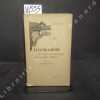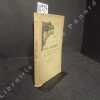-
Type
Book (10)
Magazine (3)
-
Century
19th (6)
20th (5)
-
Countries
Denmark (4)
France (9)
-
Syndicate
ILAB (6)
SLAM (2)
LE MONDE-N°2863-VENDREDI 9 AVRIL 1954
16 PAGES-DERNIERE EDITION-35 CM X 50 CM-ENTENTE CORDIALE EN ASIE?-NOUVELLE EXPLOSION ATOMIQUE DANS L'ARCHIPEL MARSHALL-AVEC LES COMEDIENS FRANCAIS AU MALY TEATR DE MOSCOU, PAR ROBERT KEMP-L'EGYPTE MAINTENUE SOUS LES DRAPEAUX VI LA DERNIERE PLAIE, PAR EDOUARD SABLIER-DE LA GUERRE ATOMIQUE A LA GUERRE DE TRANCHEES-L'EVOLUTION DE LA GUERRE D'INDOCHINE-AUX ASSISES DU PUY-DE-DOME PROCES BRIN-AU PALAIS-BOURBON MM. BARDON ET LE BAIL EVOQUENT LES CRIMES COMMIS DANS LE LIMOUSIN-A TRAVERS LES GALERIES: TROIS MAITRES DE L'ALLUSIF SIMA CIVET TAL COAT-L'ENTENTE CORDIALE A CINQUANTE ANS, SUR 5 PAGES, CE LION TETU, CE COQ DISERT, PAR SIRIUS, LE "CLIMAT" DIPLOMATIQUE DE 1904, PAR ALBERT MOUSSET, BREVE HISTOIRE DE L'ENTENTE CORDIALE, PAR ANDRE MAUROIS, EN PROCHE ORIENT CE FUT BEAUCOUP PLUS DUR., PAR EDOUARD SABLIER, L'OPINION DE LA PRESSE A UN SOU-LA DANSE A L'OPERA PAR OLIVIER MERLIN: "L'OISEAU DE FEU", FOKINE, STRAWINSKY, LIFAR-LA 5000 000 e 4 CV EST SORTIE DE LA REGIE RENAULT-JAUNI EN PLIURE CENTRALE DE UNE
COUVERTURE SOUPLE ETAT BON
LE MONDE-N°9069-MERCREDI 13 MARS 1974-ALAIN RESNAIS
44 PAGES-LES SUITES DE L'AFFAIRE TOUVIER L'ANCIEN CHEF DE LA MILICE DE LYON PEUT-IL ETRE POURSUIVI POUR CRIMES CONTRE L'HUMIDITE?, QUART DE PAGE-L'HYDROGENE COMBUSTIBLE DE L'AVENIR, DEMI PAGE-CINEMA, PAR JEAN DE BARONCELLI: "GLISSEMENTS PROGRESSIFS DU PLAISIR" D'ALAIN ROBBE GRILLET-LES PREMIERS PAS DES ASSEMBLEES REGIONALES, 2P-COMPLET
COUVERTURE SOUPLE ETAT TRES BON
Au gré des vents. Histoire illustrée des ballons libres.
1971 Editions Edita - 1971 - In-4, cartonnage toilé orange sous jaquette illustrée en couleurs de l'éditeur - 197 p. - Très nombreuses illustrations in et hors-texte en N&B, et nombreuses illustrations contrecollées en couleurs
Bon état - Infime pli et frottements sur la jaquette - Sous couverture plastifiée transparente
"DAVY, HUMPHRY - THE DISCOVERY OF HYDROGEN TELLURIDE - THE RIVALRY WITH GAY-LUSSAC & THENARD.
Reference : 46377
(1810)
Nouvelles Recherches électro-chimiques, principalement relatives aux substances métalliques tirées des alcalis et de terres, et à quelques combinations de l'Hydrogène. (+) Suite des Recherches... (+) Sur les Observations sur les Recherches faites p...
Paris, J. Klostermann, 1810. Contemp. hcalf. Spine gilt. Slightly rubbed. A few scratches to binding. Small stamps on verso of titlepage.In: ""Annales de Chimie, ou Recueil de Mémoires concernant la Chemie"" Tome 75. 336 pp. a. 2 folded engraved plates. Some scattered brownspots. The papers: pp. 27-77, 129-175, 256-263, 264-273, 274-289 a. 290-316.
First French version of Davy's ""The Bakerian Lecture for 1809. On some new Electrochemical Researches, on various Objects, particularly the metallic Bodies, from the Alkalies, and Earth, and on some Combinations of Hydrogene. Read November 16, 1809."", together with the controversy papers by Davy and Gay-Lussac & Thenard.""Mr. Davy having from the commencement of his electro-chemical researches, communicated the several steps of his progress to the Society (The Royal Society), takes the present opportunity of reporting the results of his further inquiries under four principal heads. First, on the nature of the metals of the fixed alkalis. Second, on the nature of Hydrogen and composition of ammonia. Thirdly, on the metals of the earth"" and Fourthly he makes a comparison between the antiphlogistic doctrine, and a modified phlogistic hypothesis.""(Abstract). He further gives arguments for considering potassium and sodium, which he discovered in 1808, as a element.""""Gay-Lussac had a slight rivalry between himself and the creation scientist Sir Humphry Davy. Davy was chemically preparing Potassium and Sodium through an electrical current, and this made Gay-Lussac and Thénard envious of his success. They too decided to perform the same task, but they had no battery at their disposal as Davy had, so they had to form another way to chemically prepare the two elements. In 1808, they used a red-hot iron fused to potash, the water-soluble form of a manufactured salt containing potassium, to perform this task, a method that Davy admitted had its advantageous qualities. Gay-Lussac and Thénard were successful in preparing Potassium, and continued to make a full analysis of its chemical properties, and began to use it for their own experiments. In 1809, Davy performed the same task, using it to reduce Boron in Boracic acid.""
The Bakerian Lecture for 1809. On some new Electrochemical Researches, on various Objects, particularly the metallic Bodies, from the Alkalies, and Earth, and on some Combinations of Hydrogene. Read November 16, 1809.
(London, W. Bulmer and Co., 1810). 4to. No wrappers as extracted from ""Philosophical Transactions"" 1810 - Part I. Pp. 16-74 and 2 engraved plates showing Davy's electrochemical apparatus for decomposing substances. The plates dampstained. Text fine and clean.
First appearence of this historical chemical paper, Davy' fifth Bakerian Lecture, in which he announced his discovery of hydrogen telluride.""Mr. Davy having from the commencement of his electro-chemical researches, communicated the several steps of his progress to the Society (The Royal Society), takes the present opportunity of reporting the results of his further inquiries under four principal heads. First, on the nature of the metals of the fixed alkalis. Second, on the nature of Hydrogen and composition of ammonia. Thirdly, on the metals of the earth"" and Fourthly he makes a comparison between the antiphlogistic doctrine, and a modified phlogistic hypothesis.""(Abstract). He further gives arguments for considering potassium and sodium, which he discovered in 1808, as a element.""Humphry Davy was one of the most brilliant chemists of the early nineteenth century. His early study of nitrous oxide brought him his first reputation, but his later and most importent investigations were devoted to electrochemistry. Following Galvani's experiments and the discovery of the voltaic pile, interest in galvanic electricity had become widespread. The first electrolysis by means of the pile was carried out in 1800 by Nicholson and Carisle, who obtained oxygen and hydrogen from water. Davy began to examine the chemical effects of electricity in 1800, and his numerous discoveries were presented in his Bakerian lectures."" - Wheeler Gift: 2518.
The Bakerian Lecture for 1809. On some new Electrochemical Researches, on various Objects, particularly the metallic Bodies, from the Alkalies, and Earth, and on some Combinations of Hydrogene. Read November 16, 1809.
(London, W. Bulmer and Co., 1810). 4to. No wrappers as extracted from ""Philosophical Transactions"" 1810 - Part I. Pp. 16-74 and 2 engraved plates showing Davy's electrochemical apparatus for decomposing substances, Davy's versions of the Voltaic-pile.. Plates a bit brownspotted, otherwise clean and fine, wide-margined.
First appearence of this historical chemical paper, Davy' fifth Bakerian Lecture, in which he announced his discovery of hydrogen telluride.""Mr. Davy having from the commencement of his electro-chemical researches, communicated the several steps of his progress to the Society (The Royal Society), takes the present opportunity of reporting the results of his further inquiries under four principal heads. First, on the nature of the metals of the fixed alkalis. Second, on the nature of Hydrogen and composition of ammonia. Thirdly, on the metals of the earth"" and Fourthly he makes a comparison between the antiphlogistic doctrine, and a modified phlogistic hypothesis.""(Abstract). He further gives arguments for considering potassium and sodium, which he discovered in 1808, as a element.""Humphry Davy was one of the most brilliant chemists of the early nineteenth century. His early study of nitrous oxide brought him his first reputation, but his later and most importent investigations were devoted to electrochemistry. Following Galvani's experiments and the discovery of the voltaic pile, interest in galvanic electricity had become widespread. The first electrolysis by means of the pile was carried out in 1800 by Nicholson and Carisle, who obtained oxygen and hydrogen from water. Davy began to examine the chemical effects of electricity in 1800, and his numerous discoveries were presented in his Bakerian lectures."" - Wheeler Gift: 2518.Also with William Hyde Wollaston ""The Croonian Lecture. Read November 16, 1809.(On Muscular Action - On Sea-Sickness - On the salutary Effects of Riding, and other Modes of Gestation). Pp. 1-15.
Les Aérostiers militaires.
Demi-reliure in-4 en cuir, dos à titrage, filets et frises de points dorés. Paris : H. Lecène et H. Oudin, "Nouvelle bibliothèque illustrée de vulgarisation", 1889. 319 pages illustrées par Gil Baer en noir in-texto et hors-texte (11 planches en noir, dont 1 en frontispice), plans, dessins, tableaux, photographies, 1 carte des itinéraires suivis par les aérostiers militaires pendant la Campagne du Tonkin - 1884. Coins émoussés, mors fragiles, coiffe de tête arasée.
Les aérostiers de Coutelle / Pendant le siège de Paris / Les précurseurs de la navigation aérienne / L'école de Chalais et les aérostiers modernes.
Être juif aujourd'hui un livre pour comprendre l'histoire la religion et la culture des juifs/
ancien exemplaire de bibliothèque déclassé Sans date.
bon etat
LA RECHERCHE
N° 143 - Avril 1983 Une revue d'environ 140 pages, format 295 x 220 mm, brochée, illustrée
Au sommaire de ce numéro, entre autres : Galilée ; les médicaments de la mer ; l'hydrogène atomique ; le mystère de Santorin
Phone number : 04 74 33 45 19
La Vie Scientifique, Revue Universelle des Inventions Nouvelles et Sciences Pratiques du Cyclisme et de l'Automobilisme - Sous la direction de Max de Nansouty - Secrétaire de la rédaction : Gaston Jougla
Reference : 100584
(1901)
La Vie Scientifique, Revue Universelle des Inventions Nouvelles et Sciences Pratiques du Cyclisme et de l'Automobilisme, n°298
1901 N° 298 - 15 Juin 1901 - Publication hebdomadaire illustrée - Editions F. Juven & Cie - In-4, broché - pp.461-480, nombreuses images en N&B.
Bon état. Dos émoussé, pages jaunies.
Electrochimie. Production électrolytique des composés chimiques. Deuxième édition.
sd Editions Gauthier-Villars / Masson et Cie, Collection "Encyclopédie Scientifiques des Aide-Mémoire" - Sans date (fin XIXème) - Petit in-8, broché - 173 p. - Quelques illustrations in-texte en N&B
Bon état - Pli de lecture et légers frottements au dos - Légères rousseurs sur la tranche latérale
Conquête (La) de l'air.
Paris, Blétry Frères, 1886 ; in-8, broché ; 16 pp., couverture bleue imprimée.
EDITION ORIGINALE rarissime de cette "conférence sur les Ballons dirigeables" organisée par la Société des Amis des Sciences, sous la présidence de M. Pasteur, de M. le commandant Renard, chef du service de l'aérostation militaire (compte-rendu par Blétry Frères ingénieurs civils, en date du 10 avril 1886). Bel exemplaire.


Phone number : 06 60 22 21 35
"ÅNGSTRÖM, A.J. (ANDERS JONAS). - THE DISCOVERY OF HYDROGEN IN THE SUN.
Reference : 44063
(1862)
Ueber die Fraunhofer'schen Linien im Sonnenspectrum. (Mitgetheilt vom Hrn. verf. aus d. Oefversigt af K. vet. Acad. Förhandl."" 1861, No 8, nebst einem späteren Zusatz).
Leipzig, Johann Ambrosius Barth, 1862. Without wrappers as issued in ""Annalen der Physik und Chemie. Hrsg. von J.C. Poggendorff"", Vierte Reihe Bd. 27 (117), Stück Zwei, No. 10. The entire issue offered. Titlepage to vol. 27. Pp. 193-352 a. 1 engraved plate. Ångströms paper: pp. 290-302.
First appearance in German of Ångström's famous paper in which he announced the discovery of hydrogen in the atmosphere of the sun and in which he also confirmed the probable existence of of other elements there. The paper appeared in ""Oefversigt af K. Vet. Acad. Förhandl."" in 1861. The German paper here is expanded. At the same time it was translated into English and publishe as ""On the Fraunhofer Lines Visible in the Solar Spectrum"".Ångström was one of the early formulators of the science of modern spectroscopy" he wrote extensively on terrestrial magnetism, the conduction of heat, and especially spectroscopy. He published a monumental map of the normal solar spectrum that expressed the length of light waves in units of one ten-millionth of a millimeter, a unit of length now known as the angstrom. He discovered that hydrogen is present in the sun's atmosphere, and he was the first to examine the spectrum of the aurora borealis.
 Write to the booksellers
Write to the booksellers






![Conquête (La) de l'air.. [Renard, Commandant]](https://static.livre-rare-book.com/pictures/CLA/10727_1_thumb.jpg)

